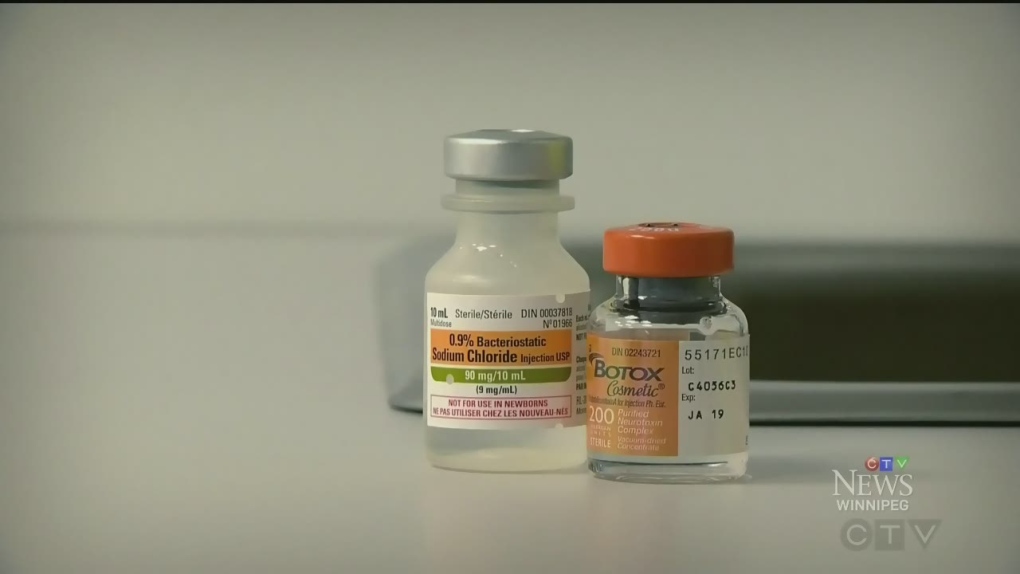'Very unrealistic expectations': Winnipeg plastic surgeons say Botox, fillers becoming more popular with Gen Z
 (Magnus Mueller / pexels.com)
(Magnus Mueller / pexels.com)
With the number of Gen Z patients seeking cosmetic procedures rising in the United States, a Winnipeg plastic surgeon said that demographic in our city isn’t necessarily trending towards the knife, but rather the needle.
Numbers released by the American Academy of Facial Plastic Surgery and Reconstructive Surgery show 75 per cent of facial plastic surgeons reported an increase in the number of patients under 30 requesting cosmetic surgery or injectables in 2022.
That represents a consistently higher plateau over the five previous years.
Double board-certified plastic surgeon Dr. Michael Brichacek said while he hasn’t seen the number of patients under 30 rise at his Winnipeg clinic and surgery centre, there is a growing trend in that age group towards injectables, hoping to achieve an aesthetic popularized on social media.
“A few years ago, the big lips were kind of a huge thing, and that's faded out a little bit. We are seeing some younger patients coming in for Botox, more as a preventative thing.”
The plastic surgeon says other current fads gaining popularity are buccal fat reduction, chin implants and Barbie noses.
Brichacek advises patients of any age should treat such procedures with the permanence of a tattoo, and says it's important to remember that trends change. However, unlike being inked, just because a procedure is requested doesn’t mean Brichacek will perform it.
“If someone comes in and they're 20 years old and they're asking for a facelift, I'm not going to be doing a facelift on that person. Sometimes it's about educating patients,” he said.
“Some other patients come in who say ‘my face is disfigured or asymmetrical,’ and I look at them and they look fine. Sometimes those patients have things like body dysmorphic disorder.”

SOCIAL MEDIA’S LINK TO BODY IMAGE ISSUES
Brichacek said social media plays a large role in influencing beauty standards, for better or worse.
“Social media isn't necessarily a good influence. A lot of pictures you see on there are edited, and we have patients coming in, some with very unrealistic expectations.”
Doctor Elia Abi-Jaoude, a staff psychiatrist and assistant professor at the University of Toronto said a number of studies have shown a clear association between social media use and body image concerns or disordered eating.
“Basically, people who use social media more tend to have more difficulties, more concerns about body image,” he said in a phone interview with CTV News Winnipeg.
“But (studies) don't necessarily indicate a cause and effect. Is it perhaps the other way around, that people who have more body image concerns tend to browse social media more?”
Abi-Jaoude said social media’s influence on body image presents a cause for concern. There are tools to mitigate its effects, he said, like becoming more media literate and putting limits on social media use.
The psychiatrist is also quick to point out that social media can be used in positive ways, like fostering self-expression, creativity and a sense of community.
“The way I put it forward to young people is - are you using the social media or is social media using you?” he said.
“With a lot of young people, the way they're using social media is in an uncritical way, and the amount of time that they spend on it, it brings with it a lot of challenges.”
 (File Image: myboys.me/Adobe Stock)
(File Image: myboys.me/Adobe Stock)
PARENTS HAVE KEY ROLE TO PLAY IN KIDS’ SELF-ESTEEM: ADVOCATE
Aisha Fairclough co-founded Body Confidence Canada, an organization that advocates for equitable and inclusive images, messages, practices and policies supporting body diversity.
She said improving body image in young people is not only about eliminating damaging online images of beauty standards altogether. Rather, she recommends parents and caregivers monitor social media use, talk to their kids about what they’re seeing and model self-love.
“The power of language is so important. We normalize fat talk in everyday life. We sit at the kitchen table and say ‘I can’t eat that,’ or ‘it’s my cheat day,’” she said.
“The truth is, when kids see parents loving themselves and feeling safe in their body, they ultimately start to feel the same way.”
Abi-Jaoude agrees parents serve as important safeguards against some of the pitfalls of social media. It can be a positive tool, he said, when it’s enhancing real-life relationships as opposed to replacing them.
“Young people who have a sense of purpose in life, they also tend to be better protected from these negative impacts. Then when they feel more confident, then there's less of a tendency of comparing themselves negatively to others.”
CTVNews.ca Top Stories

Thousands of structures destroyed in L.A. County's most destructive fire
A series of wildfires tore through densely populated parts of the Los Angeles, Calif. area. Five people have been reported dead. U.S. Gov. Gavin Newsom said thousands of resources have been deployed to contain the fires.
Is the Hollywood sign on fire?
As fires scorch Los Angeles, fake images and videos of a burning Hollywood sign have circulated on social media.
U.S. Supreme Court rejects Trump's bid to delay sentencing in his New York hush money case
A sharply divided U.S. Supreme Court on Thursday rejected president-elect Donald Trump's final bid to put his New York hush-money case on hold, clearing the way for him to be sentenced for felony crimes days before he returns to the presidency.
Ex-Trump adviser says Canada in 'difficult position' amid tariff threat, Trudeau resignation
In the face of a potential tariff war, U.S. president-elect Donald Trump's former national security adviser John Bolton says 'Canada is in a difficult position' in part due to Prime Minister Justin Trudeau's resignation and a looming general election.
PM Trudeau says he thinks Trump is using talk of Canada becoming 51st state to distract from tariff impact
Prime Minister Justin Trudeau says he thinks U.S. president-elect Donald Trump is drumming up drama on Canadian statehood to detract from tariff talks.
Canadian travellers now require an ETA to enter U.K. Here's what to know
Starting Jan. 8, Canadians visiting the U.K. for short trips will need to secure an Electronic Travel Authorization (ETA) before boarding their flight, according to regulations set out by the U.K. government.
'True when I said it, true today': former Canadian PM Harper pushes back against Trump on social media
Former prime minister Stephen Harper doesn’t find U.S. president-elect Donald Trump’s jibes about Canada becoming the 51st U.S. state very amusing.
Poilievre says the next Canadian election will be about the carbon price
Pierre Poilievre returned to Ottawa on Thursday after the holidays with a familiar demand for Justin Trudeau: call a carbon-tax election.
More than 150 students sick at University of Guelph, says public health
More than 150 cases of gastroenteritis have been reported at the University of Guelph.
































